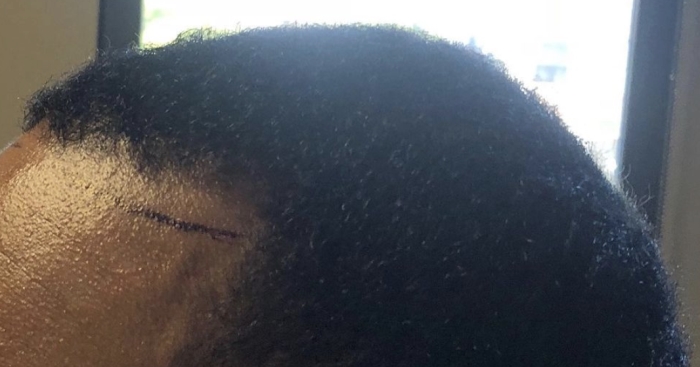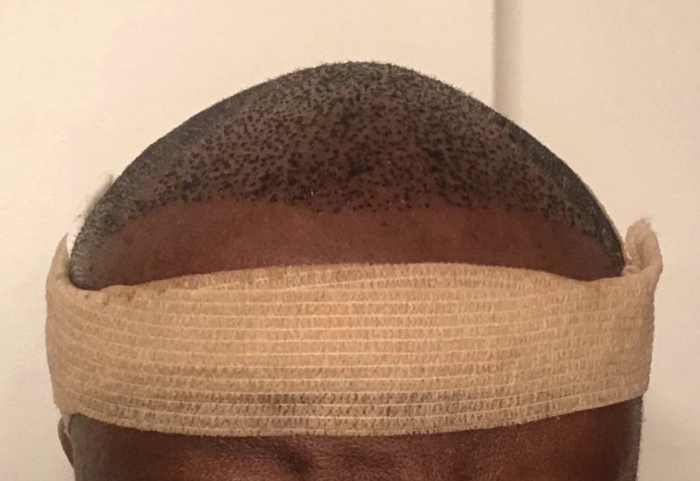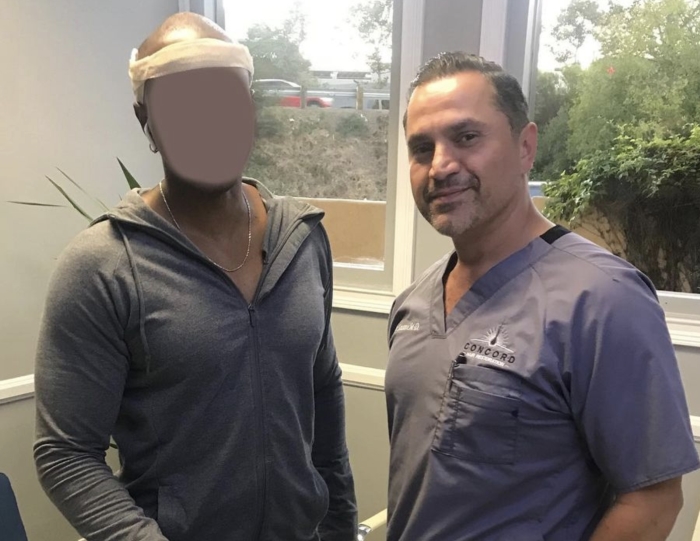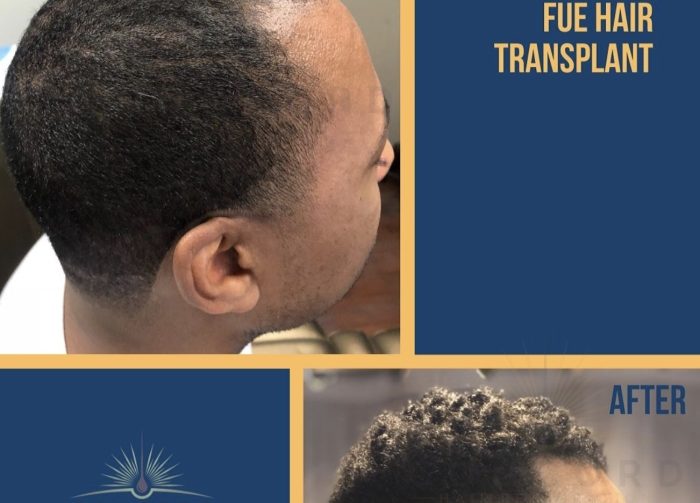Men’s African American Hair Transplant
Men’s Afro-American Hair Transplant Services
African American Hair Transplant: A Solution for Hair Loss
Experiencing hair loss can be deeply distressing for anyone, and it poses a unique set of challenges for African-American men and women due to the distinct characteristics of their hair. This can make achieving a successful hair transplant more complex. However, with the appropriate methods, it’s entirely possible to attain natural-looking results.
At Concord Hair Restoration, we are acutely aware of the specific concerns and requirements of our African-American clients. We have honed specialized techniques tailored to effectively combat hair loss in this demographic. Our team of board-certified plastic and reconstructive surgeons is proficient in the most advanced hair transplant methods, including Follicular Unit Extraction (FUE) and Follicular Unit Transplantation (FUT), ensuring we provide the best possible outcomes for our patients.
FUE: A Minimally Invasive Hair Transplant Technique
FUE is a minimally invasive hair transplant technique that involves extracting individual hair follicles from the donor area and transplanting them to the recipient area. This technique is ideal for African-American patients because it allows for the transplantation of smaller, naturally occurring groups of hair, resulting in a more natural-looking outcome. Additionally, FUE does not require a linear incision, so there is no visible scarring in the donor area.
FUT: A Traditional Hair Transplant Technique
FUT is a traditional hair transplant technique that involves removing a strip of hair from the donor area and then dissecting it into individual hair follicles for transplantation. This technique is still popular among some patients, especially those with a larger balding area, as it allows for a larger number of hair grafts to be transplanted in a single session.
Our Approach to African American Hair Transplant
At Concord Hair Restoration, we take a personalized approach to hair transplantation. Our surgeons will work with you to develop a treatment plan that is tailored to your specific needs and goals. We understand that every patient is unique, and we strive to achieve natural-looking results that blend seamlessly with your existing hair.
Results you can expect
You can expect natural-looking results that blend seamlessly with your existing hair. Our patients report a boost in self-confidence, and a renewed sense of youthfulness.
Dr. Ben Mousavi MD, ABHRS, a highly professional and devoted hair transplant physician is a well-renowned physician, is specialized in African American hair transplants. He is professional in both the FUE and FUT (Strip) methods. His main regime of specialty is in Ethnic hair Follicular Unit Extraction (FUE). Dr. Mousavi is a diplomat of the American Board of Hair Restoration Surgery (ABHRS) and endorsed by the International Alliance of Hair Surgeons (IAHRS) and the American Hair Loss Council.
Dr. Mousavi is highly experienced in Afro-American Men’s hair transplants and he deals with each of his clients with great care. While other physicians mostly do not perform FUE on Afro-Americans, Dr. Mousavi has been performing the same technique in ethnic patients successfully for years. During the years of his keen experience and practice, he has devised such techniques and methods which result in extracting a better graft and ultimately a better hair transplant.

Why is FUE in Afro-Americans more Challenging than Caucasian hair FUE?
The simple and logical answer to it is that ethnic hairs are curly and it is the very thing to which it is not easy to deal with for regular hair transplant surgeons, while Dr. Mousavi deals with such types of cases on daily basis. That’s why Dr. Mousavi is a better and safer choice.
He has performed so many cases of Afro-American FUE hair transplants with superb results. Surgery in common and hair transplant especially is the art of hand practice and muscle memory. Dr. Mousavi has opted for unique ways to make the graft come out fully intact as is shown in the picture below. Here, grafts are taken by the FUE technique. It can be seen clearly that how curly the grafts are and even then, they are fully intact with two to three hair follicles.

Why experience in curly hair is much important when performing FUT (Strip ) procedure?
Since Afro-Americans have curved hairs, Dr. Mousavi has managed his techniques, e.g., degree of curvature and curve the needle while performing punch and while the needle goes through the skin.
In short, Dr. Mousavi has more experience and more techniques than others which ensures efficiency along with great results.

Why does Dr. Mousavi perform one case per Day?
Dealing with only one case per day is the most important policy of Dr. Mousavi, as it is necessary for being focused on performing Afro-Americans’ curly hair transplant. The day which is yours is none others. The whole team is focused on you. There is no other surgery on that day making the doctor or other staff in hurry. This policy is necessary because ethnic hair transplant demands far more attention than other hair transplants.
What are the most common hair transplant techniques used for African American hair?
The two most common hair transplant techniques used for African American hair are Follicular Unit Transplantation (FUT) and Follicular Unit Extraction (FUE). FUT involves removing a strip of hair from the back of the head and then transplanting individual hair follicles to the thinning or balding areas. FUE involves removing individual hair follicles directly from the scalp and transplanting them to the thinning or balding areas. Both techniques can be effective for African American hair, but the best option will depend on the individual’s specific needs and goals.
What are the causes of African-American hair loss?
There are several potential causes of hair loss in African Americans, including:
- Genetics: African Americans have a high prevalence of a condition called androgenetic alopecia, which is a form of hair loss that is inherited and caused by the presence of the androgen hormone dihydrotestosterone (DHT).
- Hormonal imbalances: High levels of stress, pregnancy, and menopause can lead to hormonal imbalances that can cause hair loss.
- Traction alopecia: African American women often style their hair in tight braids, weaves, or ponytails, which can lead to hair loss due to traction on the hair shafts.
- Scalp disorders: Scalp conditions such as psoriasis and eczema can lead to hair loss in African Americans.
- Nutritional deficiencies: A diet lacking in essential nutrients such as protein, iron, and vitamin D can lead to hair loss.
- Medications: Certain medications, such as blood thinners, birth control pills, and antidepressants, can cause hair loss.
It is important to consult with a doctor or a trichologist to determine the exact cause of hair loss and to receive proper diagnosis and treatment.
How does the hair transplant process differ for African American hair compared to other hair types?
The hair transplant process for African American hair is similar to that of other hair types, but there are a few key differences to take into consideration. African American hair is typically more fragile and prone to breakage, so the surgeon must be careful to avoid damaging the hair during the transplant process. Additionally, African American hair is typically coarser and thicker than other hair types, which can make it more difficult to extract and transplant.
Another important consideration is that African American hair tends to be tightly curled, which can make it more challenging to achieve a natural-looking result. The surgeon will need to take this into account when determining the angle and direction of the transplanted hair. Additionally, African American hair typically has a wider range of hair density and hair caliber compared to other hair types. The surgeon will need to take this into account when planning the transplant and to ensure that the results will look natural.
Lastly, in some cases, the surgeon may need to use a different technique, such as FUE (Follicular Unit Extraction) rather than FUT (Follicular Unit Transplantation) to extract the hair. FUE is more precise and less invasive, and it is less likely to cause scarring, which is a concern in African American patients since they tend to have a more pronounced scarring tendency.

